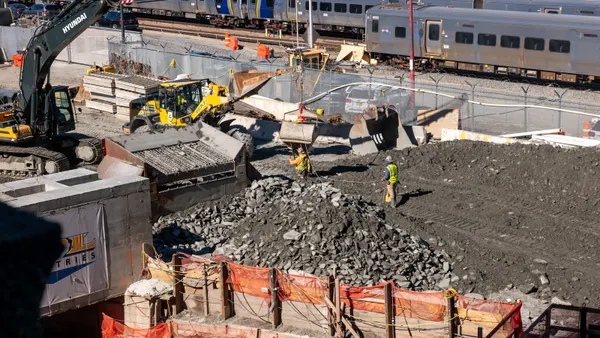Dive Brief:
- The Illinois House of Representatives this month passed an amendment to the state's Wage Payment and Collection Act that could make general contractors responsible for the wages of their subcontractors’ employees. The state Senate will now take up the bill.
- The liability for a subcontractor’s unpaid wages would lie with the direct contractor — the company in contract with the owner — even if the direct contractor has paid the subcontractor in full.
- The law as proposed would also apply to lower-tier subcontractors and cover fringe and benefit payments owed to third parties on behalf of employees. Just as in most other civil actions, the direct contractor’s property could be seized in order to raise the money necessary to pay back wages and benefits.
Dive Insight:
In addition to wages and benefits, the direct contractor would be responsible for interest on those payments, but not fines and penalties. The proposed regulation would give direct contractors the right to examine the records of subcontractors and lower-tier subcontractors in the course of the project to ensure that they are paying their employees.
The Illinois proposal is similar to laws that California and Maryland have passed in the last few years and is being met with the same pushback from some small business and construction industry groups. The Illinois Chapter of the Associated Builders and Contractors is opposed to it, and the National Federation of Independent Business called it "unfair to general contractors” and predicted that its passage will drive up the cost of construction.
"General contractors could end up paying construction workers twice," NFIB's Illinois director Mark Grant said in a statement, "once when they pay the subcontractor and again if the subcontractor keeps the money and refuses to pay them."
Such legislation can give state officials extra teeth in pursuing payment for those workers left in the lurch by unscrupulous contractors. In California, where GC's liability for subs' unpaid wages was enacted for contracts signed on or after Jan. 1, 2018, officials have been aggressive in addressing wage theft violations.
An investigation into specialty contractor RDV Construction revealed that the company had withheld almost $5 million of wages from its employees during a three-year period. After the state added $1.7 million in liquidated damages and $5.4 million in penalties, the amount RDV owed employees and the state reached $12 million.
But there are other potential consequences to the provisions of the California, Maryland and proposed Illinois law besides potentially paying workers twice.
When surety companies issue payment and performance bonds for a project, they're guaranteeing the payment of labor, materials and equipment in case the general contractor cannot meet its obligations. Because surety companies could be on the line for extra wages in these state, they may identify more risk when underwriting bonds and contractors could end up paying extra.













